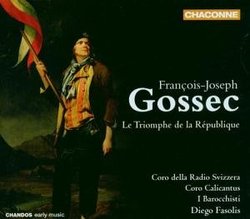| All Artists: Claudio Danuser, Francois-Joseph Gossec, Diego Fasolis, Guillemette Laurens, I Barocchisti, Antonella Balducci, Salome Haller, Makoto Sakurada Title: Gossec: Le Triomphe de la R�publique Members Wishing: 0 Total Copies: 0 Label: Chandos Original Release Date: 1/1/2006 Re-Release Date: 5/23/2006 Genre: Classical Styles: Chamber Music, Historical Periods, Classical (c.1770-1830) Number of Discs: 1 SwapaCD Credits: 1 UPC: 095115072721 |
Search - Claudio Danuser, Francois-Joseph Gossec, Diego Fasolis :: Gossec: Le Triomphe de la R�publique
 | Claudio Danuser, Francois-Joseph Gossec, Diego Fasolis Gossec: Le Triomphe de la R�publique Genre: Classical
|
Larger Image |
CD Details |
CD ReviewsRed, White, and Blue Giordano Bruno | Wherever I am, I am. | 09/03/2008 (5 out of 5 stars) "The tricolor and the stars&stripes. Not an accident. The Apostles Thomas - Paine and Jefferson - had no doubts that the American and French Revolutions were tightly connected, and that together they were the greatest event of human history, the toppling of the old aristocratic order and the foundation of Liberty, Equality, and Fraternity - "Life, Liberty, and the Pursuit of Happiness" - forevermore. Both revolutions fell prey to reaction and violence, as revolutions always seem to do. If you don't find that statement applicable to the USA, you don't know your American history very well. But if your heart doesn't swell, as Gossec's did, at the first flush of freedom in revolutionary France before the Terror... if you can't share Beethoven's idealistic enthusiasm for Napoleon before his Judas betrayal... if you can't acknowledge that your democratic life style in this era of mass prosperity was born with the Americo-French Revolution, then you won't find Gossec's "Le Triomphe de la Republique" of any value at all. Francois-Joseph Gossec (1734-1829) was a successful and fashionable composer within the Parisian establishment before the Revolution. In 1789, his life was transformed and he became the composer of the revolutionary People, like the painter David putting all his art and craft at the service of the Republic. He wrote the requiem mass for the ceremony honoring victims of the storming of the Bastille. Ceremonies involving music became more numerous in the next years, as music emerged from the salon of the aristocracy into public open air. The music itself changed, becoming simpler, more majestic, more attuned to the taste and understanding of the common people. Gossec wrote the oratorio Le Triomphe de la Republique to celebrate the French victory at the Battle of Valmy in September, 1792. The libretto describes that event and culminates in a grand procession of the Human Race, dancing and singing in praise of Liberty. Costumes, pantomime, huge forces of singers and instruments, firing of cannons, the descent of the goddess Liberty on ropes and pulleys - all the elements of a popular spectacle were included in the performance. Gossec was a sophisticated composer - on a par in his symphonies with his contemporaries Haydn, Spohr, and Boccherini - but the music in Le Triomphe is not of that intellectual bent. Most of it is based on the forms and styles of village dances; French folk music had existed for centuries quite apart from the rarified compositions of the Concert Spirituel and the Royal Chapel. Gossec's choice was not to "elevate" folk music to classical complexity but rather to put classical skills of instrumentation and harmony at the service of of the New Order, the Novus Ordo Seculorum honored on the Great Seal of America. As a 21st Century music lover, I have to acknowledge that Le Triomphe is a "one trick pony" - a piece of music to be heard once and perhaps only once. The interest I feel in it is more historical than aesthetic. As a 21st Century believer in the ideals of the Enlightenment and the French Revolution, I find Le Triomphe thrilling and revelatory. The booklet that accompanies the disk is thick with fascinating historical commentary as well as a full libretto, in French, English, and Italian. The performance by I Barrocchisti, with two Swiss choruses, is enthusiastic and masterful." Triumphant Republican Music Gregory M. Gorsuch | N. Charleston, SC USA | 11/14/2009 (5 out of 5 stars) "An interesting and historically accurate recreation of an interesting genre of music. Although Gossec was well known for his more subdued classical works, this represents an heroic paen to a General Hoche's military victory for the short lived French Republic. A tone poem at first depicting a battle, it is subplanted with choral passages calling forth the praises to victory and ending with a celebration which includes folk melodies and dances. It is a delightful and interesting work, with a little bit of everything for the listener."
|

 Track Listings (30) - Disc #1
Track Listings (30) - Disc #1